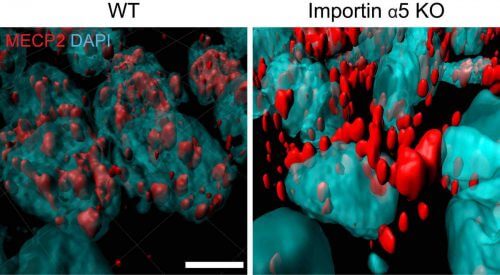Weizmann Institute of Science scientists discovered a neural mechanism that was not known until now; The findings may pave the way for new treatments for anxiety disorders

Anxiety disorders are the most common of the mental disorders: according to estimates, every third person may suffer from a severe anxiety disorder of one type or another during their lifetime. Weizmann Institute of Science scientists have discovered a neural anxiety mechanism that was not known until now. The findings are published today in the scientific journal Cell reports may make it possible to develop new treatments for anxiety disorders.
Prof. Mike Feinzylver's laboratory in the Department of Biomolecular Sciences has been researching "import proteins" (importins) for almost two decades. These proteins lead molecules into the cell nucleus in all types of cells. The laboratory investigates the role of importins in nerve cells, and until recently focused on the peripheral nervous system. In 2012, the post-doctoral researcher Dr. Nicholas Paniotis joined the laboratory, who focused on the role of importins in the central nervous system, that is, the brain and spinal cord.
Dr. Paniotis and his colleagues studied five "lineages" of genetically engineered mice in the laboratory of Prof. Michael Bader at the Max Delbrück Center for Molecular Medicine in Berlin. The mice in each lineage were missing a particular gene from a subfamily of importins known as the alpha subfamily. The researchers conducted behavioral experiments on these mice and discovered that only the mice lacking the importin alpha-5 gene stood out with a unique feature: they did not show anxiety in stressful situations - for example, when they were placed in an open space or on a particularly high surface.
The anti-anxiety drugs available today are limited in terms of their effectiveness or cause side effects that limit their usefulness. Our findings indicate the possibility of developing drugs that will allow overcoming these limitations"
The researchers examined how the "calm" mice differed from normal mice in terms of gene expression in brain areas involved in the control of anxiety. Computational analyzes indicated differences in the expression of several genes controlled by the MeCP2 gene, which is known to play a role in controlling anxious behaviors. Following these findings, it became clear that importin alpha-5 is essential for the entry of MeCP2 into the cell nucleus, and that when MeCP2 levels in the nucleus change, the expression of the enzyme involved in the production of the S1P signaling molecule also changes. In other words, in mice that lacked alpha-5 importin, the MeCP2 did not enter the nucleus of the nerve cells that control anxiety, and this led to a decrease in S1P signaling and subsequently to a reduction in anxiety.
After additional experiments designed to confirm that a new neural pathway had indeed been discovered in the brain, the scientists began to examine molecules that affect this pathway. The researchers discovered that there are drugs on the market that affect S1P signaling. One of them, fingolimod, is used as a medicine for multiple sclerosis. When the scientists tested the effect of fingolimod on normal mice, they found that these mice were less anxious under stressful circumstances, similar to genetically modified mice without the alpha-5 importin gene. In a previously published clinical study it was reported that fingolimod does have a calming effect on multiple sclerosis patients taking the drug; The new findings may provide an explanation for this calming effect.
"Our findings open a new direction for researching the mechanisms of anxiety," says Dr. Paniotis. "If we understand exactly how the mechanisms we discovered control anxiety, this understanding may help develop new drugs or allow the use of existing drugs, in order to alleviate the symptoms of anxiety."
Says Prof. Feinzylver: "The anti-anxiety drugs available today are limited in terms of their effectiveness or cause side effects that limit their usefulness. Our findings indicate the possibility of developing drugs that will allow overcoming these limitations. In fact, we have already identified several molecules that affect the nervous mechanism discovered in the research, and therefore may be candidates for use as drugs."
In addition, the findings shed new light on rare genetic diseases characterized by mutations in the MeCP2 gene: Rett syndrome and MeCP2 duplication syndrome; In both, anxiety is one of the symptoms. Identifying the exact mechanisms responsible for the entry of MeCP2 into the nuclei of nerve cells may allow in the future to develop drugs for these two diseases.
Dr. Shahar Dagan, Anna Mashcheriakov, Dr. Sandeep Koley, Dr. Letitia Marbaldi, Didi Anders Song and Prof. Eitan Reuveni from the Institute's Department of Biomolecular Sciences participated in the study; Dr. Anton Shainin from Tel Aviv University; Prof. Yitzhak Michalevsky from Ariel University in Samaria; Dr. Michael Menachem Tzuri from the Department of Veterinary Resources of the Weizmann Institute of Science; Dr. Francesca Rutter, Prof. Eno Hartman and Prof. Michael Bader from the Max Delbrück Center for Molecular Medicine in Berlin; and Dr. Mayur Wadhwani and Prof. Britta Eichholt from the Sharita School of Medicine, also in Berlin.
